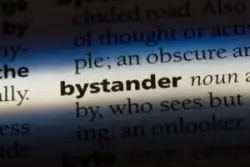
Written By: Attorney Branson Rogers
CALL THE WRONGFUL DEATH LAWYERS AT ZINDA LAW GROUP AT (800) 863-5312
When a loved one is hurt in any kind of accident, that experience is often traumatic, scary, and difficult, not only for the victim, but also for the victim’s loved ones. In certain circumstances, these loved ones may have a specific claim of their own due to the victim’s injury. Two such situations are wrongful death claims and bystander recovery claims, which can sometimes overlap, but are very different claims.
The main differences between bystander recovery and wrongful death claims include who the claim is about, whether the person observes the victim’s injury, what harm the victim suffered, the relationship between the person and the victim, and the potential recovery you can seek. Whenever a loved one is injured, it is important to know the different claims that might exist for both yourself and the victim.
If a loved one has been seriously injured or killed, the attorneys at Zinda Law Group may be able to help. We have the knowledge and resources necessary to help the victim, and potentially the family as well. We may help you seek maximum compensation for medical bills, loss of earnings, pain and anguish, and more.
Call us today at (800) 863-5312 for a free consultation with one of our lawyers.
For a free legal consultation, call 800-863-5312
WHO IS THE CLAIM ABOUT?
Both bystander claims and wrongful death claims can occur when a loved one is seriously injured, but whom the claim is about differs. In a wrongful death claim, the family members of the deceased bring a claim for harm and losses they suffer due to the loss of the deceased. Thus, this claim is about the deceased and how the loss of the deceased affects each family member. This is why wrongful death claimants bring the claim both individually and on behalf of the deceased. Additionally, only one lawsuit may be filed on behalf of the deceased.
Read More: How Is a Wrongful Death Settlement Divided Among Family Members?
In a bystander claim, a family member brings a claim for the harms and losses he or she suffers due to observing the victim’s accident. While a bystander claim cannot happen without observing a family member’s accident, the claim is not about the harm or damage to the victim, but instead the harm to the bystander due to observing the event. Unlike wrongful death claims, bystander claims are only brought individually and not on behalf of a victim. Further, bystander claims are not limited to only one lawsuit, but instead may be brought individually by as many people that fit the criteria of the claim.
Learn More: How to File a Wrongful Death Claim
OBSERVING THE ACCIDENT
A key feature that separates bystander claims from wrongful death claims is that, as you might expect based on the name of the claim, a person must observe the accident to bring a bystander claim. What qualifies for observing an accident can vary a lot from state to state, so it is important to consult an attorney for guidance.
For example, some states may require that you observe the accident itself, while others may allow you to bring the claim by observing the aftermath of the accident. Further, some states may require a physical reaction to observing the accident or aftermath, such as vomiting, retching, crying, etc., to prove that you experienced mental or emotional trauma. All of these requirements about what you observed only apply in a bystander claim, but can be difficult to navigate without consultation.
Click to contact our personal injury lawyers today
SEVERITY OF HARM TO THE VICTIM
Another way these two claims differ is based on what level of harm the victim must have experienced. Wrongful death claims are limited to circumstances where someone loses their life due to another’s negligence or intentional act. Even the most severe injuries will not create a wrongful death claim unless the victim loses their life.
Bystander claims, however, do not require any specific level of harm to the victim, although most of them involve severe or traumatic events. What these claims instead require is that the accident must be so shocking to the bystander that the bystander suffers serious emotional trauma due to the accident. Accidents often can be shocking based either on the level of harm to the victim or based on the severity of the accident itself. For example, if you observe a loved one get into a severe car collision, you may be able to recover damages even if they are able to walk away unharmed. Similarly, if you observe a loved one involved in an accident that does not initially seem severe, yet creates shocking injuries anyway, you also may have a bystander claim.
Complete a Free Case Evaluation form now
RELATIONSHIP TO THE VICTIM
Both wrongful death claims and bystander claims are limited to people that are closely related to the victim, but the family members who can file suit vary between each claim.
For wrongful death claims, states can differ on who may bring the claim, but most states allow immediate household family members such as a spouse, children, etc. Other possible claimants may be parents, siblings, grandparents, or stepparents. Most states have specific laws that define who can bring a wrongful death claim.
The people who may qualify as bystanders are usually very similar to who can bring a wrongful death claim but tend to not be as clearly defined state to state. For example, in Texas, you need to be “closely related” to the victim to bring a lawsuit. While this has been held to include parents, siblings, children, and grandparents, it is unclear whether live-in significant others, stepparents, or stepchildren qualify. Overall, the required relationship to the victim is not as clearly defined and settled by law as the requirements of wrongful death claimants.
WHAT COMPENSATION YOU MAY SEEK
States also differ on what types of compensation a wrongful death claimant can pursue. Common areas of compensation include pre-death medical expenses, funeral and burial expenses, loss of the deceased’s expected income, loss of consortium, loss of inheritance, and loss of companionship.
Unlike the broad areas of compensation that you usually may pursue in a wrongful death claim, compensation for bystander claims is typically limited to the specific mental and/or emotional distress you experience. Injuries that often fall under this mental or emotional trauma that you can seek compensation for are depression, extreme anxiety, insomnia, or nightmares.
KNOWING YOUR OPTIONS – HOW ZINDA LAW GROUP MAY BE ABLE TO HELP
When a family experiences a death due to the negligence of another or observes a severe injury to one of their family members, the pain, trauma, and grief can be overwhelming. During such a trying time, it can be helpful for the family to seek the advice of an attorney so they can focus on grieving and coping with the trauma they experienced while professionals counsel the family about a potential claim. At Zinda Law Group, we seek to counsel victims and their families about all the options that are available to them and help find the options that are best for that person.
If you lost a family member or observed a family member being injured in a severe accident, call Zinda Law Group today at (800) 863-5312 for a free consultation. You will pay nothing unless we can win your case.
Meetings with attorneys by appointment only.
Call or text 800-863-5312 or complete a Free Case Evaluation form









